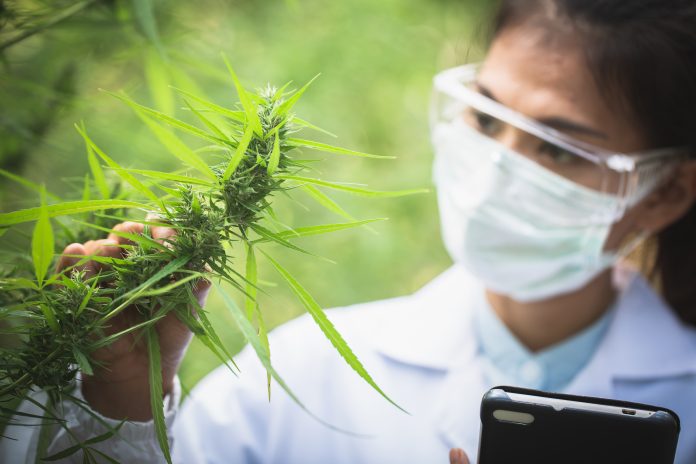Lead Scientific Officer at Always Pure Organics Andrew Megahy, explains how the UK is now in a prime position for the future of CBD use, due to the Novel Foods Application
There has been a remarkable shift in attitudes towards Cannabis worldwide, even just within the last few years. Canada, for example, went the route of full legalisation for recreational use in 2018. Many U.S. states have implemented some form of legalisation and in Europe, Switzerland has decriminalised its use. In the UK, some Cannabis-based Medicinal Products (CBMP) have been approved for use, but recreational usage is still illegal.
However, there is one component of the Cannabis sativa plant that exists in somewhat of a grey area, despite ongoing work to categorise it. Cannabidiol (CBD) has grown immensely in popularity, and recently, the global market value was estimated at around nine billion dollars at the end of 2020. Despite this, there is still a considerable lack of understanding surrounding the substance, both at a consumer and governmental level. There are steps being made to address this issue, one of which is the UK’s Novel Foods process, which will be the topic of this article.
The Novel Foods Application
CBD was declared as a Novel Food in Europe back in January of 2019. Despite this, the UK was the only country to require companies to submit an application for their CBD products, giving a deadline of the 31st of March 2021. The Novel Foods Application (NFA) process requires that applicants submit incredibly detailed information on their products, such as compositional analysis, nutritional, ADME and toxicology information, with the end goal of proving its safety to the Food Standards Agency (FSA).
There are some challenges involved in completing this process, one of which is the ever-present challenge of Brexit; the others being related to the unique situation that CBD presents. Foodstuffs typically are not sold before being proven to be safe, whereas CBD has been on the UK market since at least 2018. This led to the unusual situation where a mostly unregulated market operated freely, with no oversight on product quality or safety. Requiring an NFA was the only real route to creating a safe and regulated market that fit with the designation that the European Commission had assigned CBD.
Despite not having any regulations in place, the market in the UK had been operating successfully for several years, leading to the question: Was regulation urgently required?
There have been numerous independent articles looking at the quality of CBD products on the market, both in terms of CBD content and safety criteria such as heavy metal or pesticide presence or levels of controlled cannabinoids such as CBN or THC, which is always a risk since they are all sourced from the same plant. This last point is especially pertinent due to the recent update relating to the permitted levels of controlled cannabinoids, clarifying that only 1mg total controlled cannabinoids are acceptable. Every article investigating the levels of contaminants has found that most products contained some level of unsafe substances, with additional findings of well below advertised levels of CBD.
Clearly, there was a desperate need for the market to have some form of regulation. Safety concerns should of course be the priority, but also of importance for parties invested in the industry is the subsequent effect on consumer confidence.
Some of the major purchase drivers for CBD are the potential health benefits. Unfortunately, these can be completely undermined by a market filled with products that do not have the advertised levels of CBD and contain unsafe substances. The necessary first steps to creating a safe market that consumers can have confidence in, subsequently leading to growth and investment, is some means of regulating the multitudes of products that are available. The Novel Foods Application process was the most suitable route to achieve this.
Finally, the UK, are ‘leading the charge’ regarding Novel Foods authorisation has some interesting implications for the market. The first is whether members of the EU will wait to see how the UK deals with the process and how its citizens respond to the decision. Doing so will likely give them a better idea of how to implement their own form of regulation, including potential pitfalls to avoid. However, beginning the process independently may give them an advantage similar to what the UK can look forward to: being one of the frontrunners in having a fully regulated CBD market. While Novel Foods may restrict what products can be sold, and who can sell them, it guarantees that anything that remains on the market will be safe, reliable and effective. This, in turn, will almost guarantee market growth, especially from larger entities and investors who have avoided the already rapidly growing market due to the uncertainty surrounding its legality.
For an industry that has been made to operate in something of a grey area due to legal uncertainties, the CBD market has nonetheless managed to do incredibly well. Even in the midst of the pandemic (or perhaps because of it) growth has continued and progress has been made in improving regulations and market confidence.
The United Kingdom’s Novel Foods Application process is but one possible route to increase the safety and reliability of products, bringing the industry on par with comparable markets such as food supplements and cosmetics. CBD products can already be found in ‘health’ stores such as Boots or Holland & Barrett, so it is hardly out of the question to expect CBD to make its way into retailers such as Tesco or Asda, once products receive validation from the UK government and the FSA. From there, we can anticipate major interest from market giants such as Nestle or GSK. Regardless of how the future of the CBD industry plays out, the UK seems to be in a prime position to make the best of this opportunity.
*Please note: This is a commercial profile











